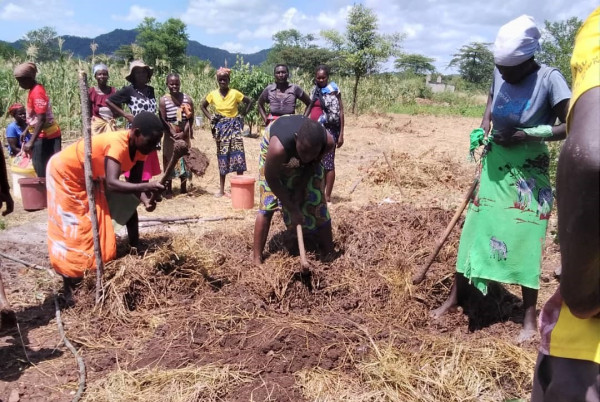
In Zimbabwe’s Kariba District, a quiet transformation is taking place; driven by knowledge, inclusion, and resilience. Under the ZRBF 2 bridging fund project, “Resilience Building in the Sebungwe Landscape”, supported by the Embassy of Ireland through UNDP and implemented by FAO in collaboration with the Ministry of Lands, Agriculture, Fisheries, Water and Rural Development, extension officers are being equipped with new tools to support climate-smart agriculture and local empowerment.
Thirteen AGRITEX officers, across 9 wards were trained using the Farmer Field School (FFS) approach, moving away from traditional top-down methods to a participatory model that empowers farmers to experiment, learn, and make their own decisions.
For Simbarashe Kashiri, an AGRITEX officer just 18 months into his role in Kariba District’s Ward 4, the shift from a traditional, top-down extension approach to the Farmer Field School (FFS) model was transformative.
“I initially thought the only method used in delivering information to farmers was the top-down method where the Agricultural Extension Officer (AEO) makes all decisions and tells farmers what to do,” Kashiri recalls. “But FFS training taught me about facilitation—where farmers are empowered to make their own decisions.”
Inspired by the training, Simbarashe immediately formed the Kujatana Farmer Field School group, comprising 24 members – 88 percent of them women. Their group is now cultivating tomatoes and producing their own organic Bokashi compost using goat manure, enhancing soil fertility and building sustainable food systems from the ground up.
Simbarashe’s story is just one of many emerging from the project’s holistic approach to resilience building. The 13 AGRITEX officers trained as FFS facilitators, helped to establish 12 Farmer Field Schools. These schools are not only technical training platforms but also spaces for empowerment, collective learning, and innovation—especially for women and youth.
The FFS initiative forms part of a broader strategy to improve natural resources management, promote climate-smart value chains, and strengthen resilience in vulnerable rural communities. Key value chains identified include goats, cattle, indigenous chickens, sorghum, fish, sesame, and chilies.
“This project contributes directly to FAO’s Strategic Framework by promoting sustainable food systems and inclusive rural transformation through capacity building, climate-smart agriculture, and stakeholder engagement,” said Obert Maminimini, FAO Crops and Extension Specialist.
With local ownership and strategic planning, Zimbabwe’s Sebungwe Landscape is on a path toward a more sustainable, resilient future.
Distributed by APO Group on behalf of Food and Agriculture Organization of the United Nations (FAO): Regional Office for Africa.



